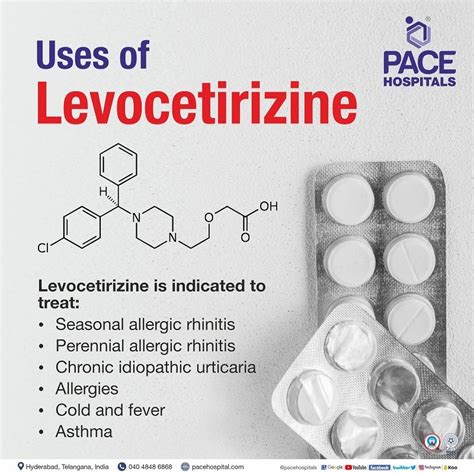Intro
Discover the uses and benefits of Levocetirizine, a powerful antihistamine medication. Learn how it provides relief from allergic symptoms, such as itching, sneezing, and runny nose. Explore its effectiveness in treating conditions like hay fever, urticaria, and atopic dermatitis, and understand its advantages over other allergy treatments.
Levocetirizine is a medication that has been widely used to treat various allergic conditions, including hay fever, hives, and itching. It belongs to a class of medications known as antihistamines, which work by blocking the action of histamine, a chemical released by the body during an allergic reaction. In this article, we will delve into the uses and benefits of levocetirizine, as well as its working mechanism, side effects, and precautions.

What is Levocetirizine Used For?
Levocetirizine is primarily used to treat allergic conditions such as:
- Hay fever (allergic rhinitis): This is an allergic reaction to airborne particles such as pollen, dust, and mold.
- Hives (urticaria): This is a skin condition characterized by itchy, raised patches on the skin.
- Itching (pruritus): This is a general term for itching sensations on the skin, which can be caused by a variety of factors, including allergies.
Levocetirizine can also be used to treat other conditions, such as:
- Atopic dermatitis (eczema): This is a chronic skin condition characterized by dry, itchy, and inflamed skin.
- Allergic conjunctivitis: This is an allergic reaction that affects the eyes, causing redness, itching, and discharge.
How Does Levocetirizine Work?
Levocetirizine works by blocking the action of histamine, a chemical released by the body during an allergic reaction. Histamine causes blood vessels to dilate, leading to increased blood flow, swelling, and itching. By blocking histamine receptors, levocetirizine reduces the symptoms of allergic reactions, providing relief from itching, sneezing, runny nose, and congestion.
Benefits of Levocetirizine
The benefits of levocetirizine include:
- Fast and effective relief from allergic symptoms
- Long-lasting relief, with some formulations providing up to 24 hours of relief
- Can be used to treat a variety of allergic conditions
- Available in various formulations, including tablets, syrup, and oral solution
- Generally well-tolerated, with few side effects

Side Effects of Levocetirizine
Like all medications, levocetirizine can cause side effects, although they are generally mild and temporary. Common side effects include:
- Drowsiness
- Fatigue
- Dry mouth
- Headache
- Stomach upset
In rare cases, levocetirizine can cause more serious side effects, such as:
- Anaphylaxis (a severe allergic reaction)
- Angioedema (swelling of the face, lips, tongue, or throat)
- Stevens-Johnson syndrome (a rare skin condition)
Precautions and Contraindications
Before taking levocetirizine, it is essential to inform your doctor of any medical conditions you have, including:
- Kidney disease
- Liver disease
- Heart disease
- High blood pressure
- Glaucoma
- Urinary retention
Levocetirizine is contraindicated in patients with:
- Known hypersensitivity to levocetirizine or other antihistamines
- Severe kidney disease
- Severe liver disease
Interactions with Other Medications
Levocetirizine can interact with other medications, including:
- Sedatives and tranquilizers
- Anticholinergic medications
- Monoamine oxidase inhibitors (MAOIs)
- Beta-blockers
It is essential to inform your doctor of all medications you are taking before starting levocetirizine.

Dosage and Administration
The dosage and administration of levocetirizine vary depending on the formulation and the condition being treated. Generally, the recommended dosage is:
- 5 mg once daily for adults and children over 12 years
- 2.5 mg once daily for children between 6 and 11 years
- 1.25 mg once daily for children between 2 and 5 years
It is essential to follow the dosage instructions provided by your doctor or pharmacist.
Pregnancy and Breastfeeding
Levocetirizine is generally considered safe to use during pregnancy and breastfeeding. However, it is essential to consult your doctor before taking levocetirizine if you are pregnant or breastfeeding.

Conclusion
Levocetirizine is a highly effective medication for treating various allergic conditions. Its benefits include fast and effective relief from allergic symptoms, long-lasting relief, and a variety of formulations. However, it is essential to be aware of the potential side effects, interactions with other medications, and precautions. By following the dosage instructions and consulting your doctor before taking levocetirizine, you can ensure safe and effective treatment for your allergic conditions.
We invite you to share your experiences with levocetirizine in the comments section below. Have you used levocetirizine to treat an allergic condition? What were your results? Share your story to help others make informed decisions about their treatment options.
What is levocetirizine used for?
+Levocetirizine is used to treat various allergic conditions, including hay fever, hives, and itching.
How does levocetirizine work?
+Levocetirizine works by blocking the action of histamine, a chemical released by the body during an allergic reaction.
What are the side effects of levocetirizine?
+Common side effects of levocetirizine include drowsiness, fatigue, dry mouth, headache, and stomach upset.
Can I take levocetirizine during pregnancy or breastfeeding?
+Levocetirizine is generally considered safe to use during pregnancy and breastfeeding. However, it is essential to consult your doctor before taking levocetirizine if you are pregnant or breastfeeding.
